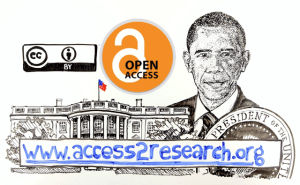
Scholarly information is often too expensive to access. Academic publishers sell journal subscriptions for thousands of dollars per journal per year. Typically, only universities and large libraries, not individuals, are able to pay those fees, which limits access to researchers and others affiliated with institutions with money.
Are these costs justifiable when the underlying research is publicly funded and the underlying goal is public knowledge? If you’re a taxpayer you’ve already paid to fund the research, so why should you pay essentially another tax to read the findings of that research?
On May 20, a team of longtime advocates for public access to scholarly information launched a campaign to urge U.S. President Barack Obama to “require free access over the Internet to journal articles arising from taxpayer-funded research.” Opening up publicly-funded research will “provide access to patients and caregivers, students and their teachers, researchers, entrepreneurs, and other taxpayers who paid for the research.”
This is consistent with Wikimedia’s non-profit mission “to empower and engage people around the world to collect and develop educational content under a free license or in the public domain, and to disseminate it effectively and globally.”

Wikimedia project volunteers, who are among the taxpayers, should not be denied free access to this information. They should be empowered to read it, report on it, and cite it. Wikipedia and its sister projects depend on the energy and unselfish dedication of this team of contributors – volunteers, researchers, and amateurs – who read and investigate sources as they work to compile accurate, up-to-date, verifiable knowledge. Each month, hundreds of millions of global readers view, and have the opportunity to evaluate and contribute to Wikimedia content. Many do not have the means (nor should they be required) to pay for knowledge, including useful economic, health and scientific information when their taxes fund the research.
We believe in open access and free licensing as fundamental forces to disseminate knowledge, support education and accelerate discovery.
Today, the Wikimedia Foundation is endorsing this petition, joining thousands of individuals and organizations expressing support for free access to taxpayer-funded research articles. We hope you will join us, too—anyone over age 13 can sign (and you do not need to be a US citizen).
Please consider signing this petition to mandate that all research funded by U.S. taxpayers be made freely available to the citizens of the Web.
Dario Taraborelli, Senior Research Analyst, Wikimedia Foundation
Geoff Brigham, General Counsel, Wikimedia Foundation
Kat Walsh, Member of the Wikimedia Board of Trustees

Can you help us translate this article?
In order for this article to reach as many people as possible we would like your help. Can you translate this article to get the message out?
Start translation